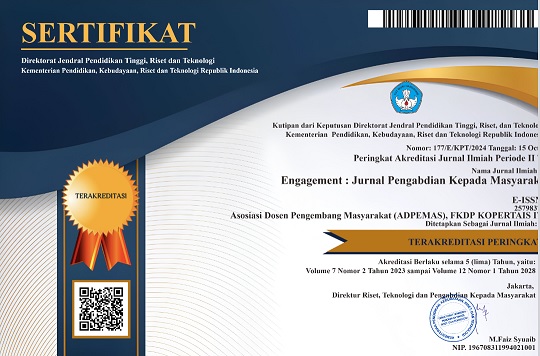Early Reading Movement through Read Aloud Training for Parents: A Community Development Project
Abstract
The National Literacy Movement is widely echoed in the school environment. On the other hand, literacy can also be developed at home for young children by parents. Reading together between parents and children is proven to be able to develop children's literacy. Herein, the Community Service activity which focuses on the initial read aloud training for parents is pivotal. The initial read aloud training aimed to train parents in a village in West Bandung Regency, West Java, to read storybooks to children. This activity was carried out in October 2018, involving 18 parents (mothers) with young children. Through this training, the involved parents showed an awareness, among mothers, of the importance of reading stories at home, selecting story books for children, and reading stories to and/or with children. Through this activity, it is hoped that parents can increase awareness of the importance of supporting literacy from an early age in children and practicing it at home. In addition, it is expected that there will be follow-up trainings such as reading assistance to parents
Downloads
References
Bano, J., Zahra Jabeen, and Sadruddin Bahadur Qutoshi. “Perceptions of Teachers about the Role of Parents in Developing Reading Habits of Children to Improve their Academic Performance in Schools.” Journal of Education and Educational Development 5, no. 2 (June 2018): 42-59.
Boerma, I. E., Suzanne E. Mol & Jelle Jolles. “Parents Adjust the Quality of Their Home Literacy Environment to the Reading Interest of Their Third to Sixth Graders.” Parenting: Science and Practice 18, (2018): 243-261.
Duursma, E., Marilyn Augustyn, and Barry Zuckerman. “Reading aloud to children: the Evidence.” Arch Dis Child 93, no. 7 (June 23, 2008): 554-557.
Gavora, P. “Preschool Children in Book-Reading Situations with Parents: The Perspective of Personal Agency Theory.” Studia Paedagogica 21, no. 4 (2016): 99-116.
Grieshaber, S., Paul Shield, Allan Luke, and Shelly Macdonald. “Family Literacy Practices and Home Literacy Resources: An Australian Pilot Study.” Journal of Early Childhood Literacy,12, no. 2 (2011): 113-138.
Hasan, A., Hyson, M., & Chang, M. C. Early Childhood Education and Development in Poor Villages of Indonesia: Strong Foundations, Later Success. Washington D. C.: The World Bank, 2013.
Keefe, E. B. and Susan R. Copeland. “What Is Literacy? The Power of a Definition.” Research & Practice for Persons with Severe Disabilities 36, no. 3 (2011): 92–99.
Kemendikbud. Permendikbud No. 23 tahun 2015. Jakarta: Kemendikbud, 2015.
Lane, H. B. and Tyran L. Wright. Maximizing the effectiveness of reading aloud. International Reading Association, (2007): 668–675. doi:10.1598/RT.60.7.7
Lawson, K. “The Real Power of parental Reading Aloud: Exploring the affective and attentional dimensions.” Australian Journal of Education 56, no. 3 (2012): 257-272.
Levy, R., Melanie Hall, and Jenny Preece. Examining the Links between Parents’ Relationships with their Pre-School Children. International Journal of Educational Psychology 7, no. 2 (2018): 123-150. doi:10.17583/ijep.2018.3480
Michigan State University Extension. Planning Your Community Service Project: Based on A Community Service Learning Model. U. S.: Michigan State University, 2007.
Morrison, V. and Lisa Wlodarczyk. “Revisiting read-aloud: Instructional strategies that encourage students’ engagement with texts.” The Reading Teacher 63, no. 2, (2009): 110–118. http://doi.org/10.1598/RT.63.2.2
Pentimonti, J. M. and Laura M. Justice. “Teachers’ use of scaffolding strategies during read alouds in the preschool classroom.” Early Childhood Education Journal 37, no. 4, (2010): 241–248.
Ramdhani, B. Rusa Suka Berteman. Bandung: Pelangi Mizan, 2018.
Saracho, O. N., & Bernard Spodek. “Families’ Selection of Children’s Literature Books.” Early Childhood Educ J 37, (2010): 401-409.
Sawyer, W. “The Powerfully Literate Citizen.” English in Australia 42, no. 2 (2007): 44-47.
Stephens, K. E. “A Quick Guide to Selecting Great Informational Books for Young Children.” The Reading Teacher 61, no. 6 (2008): 488-490.
Sudiasih, Sri. “Gerakan Literasi Sekolah Meliterasikan Masyarakat.” Dalam https://m.bernas.id/51438-gerakan-literasi-sekolah-meliterasikan-masyarakat.html
UNESCO Institute for Statistics. International Literacy Statistics: A review of Concepts, Methodology, And Current Data. Montreal, Canada: UNESCO Institute for Statistics, 2008.
Copyright (c) 2021 Engagement: Jurnal Pengabdian Kepada Masyarakat

This work is licensed under a Creative Commons Attribution-ShareAlike 4.0 International License.






.png)




